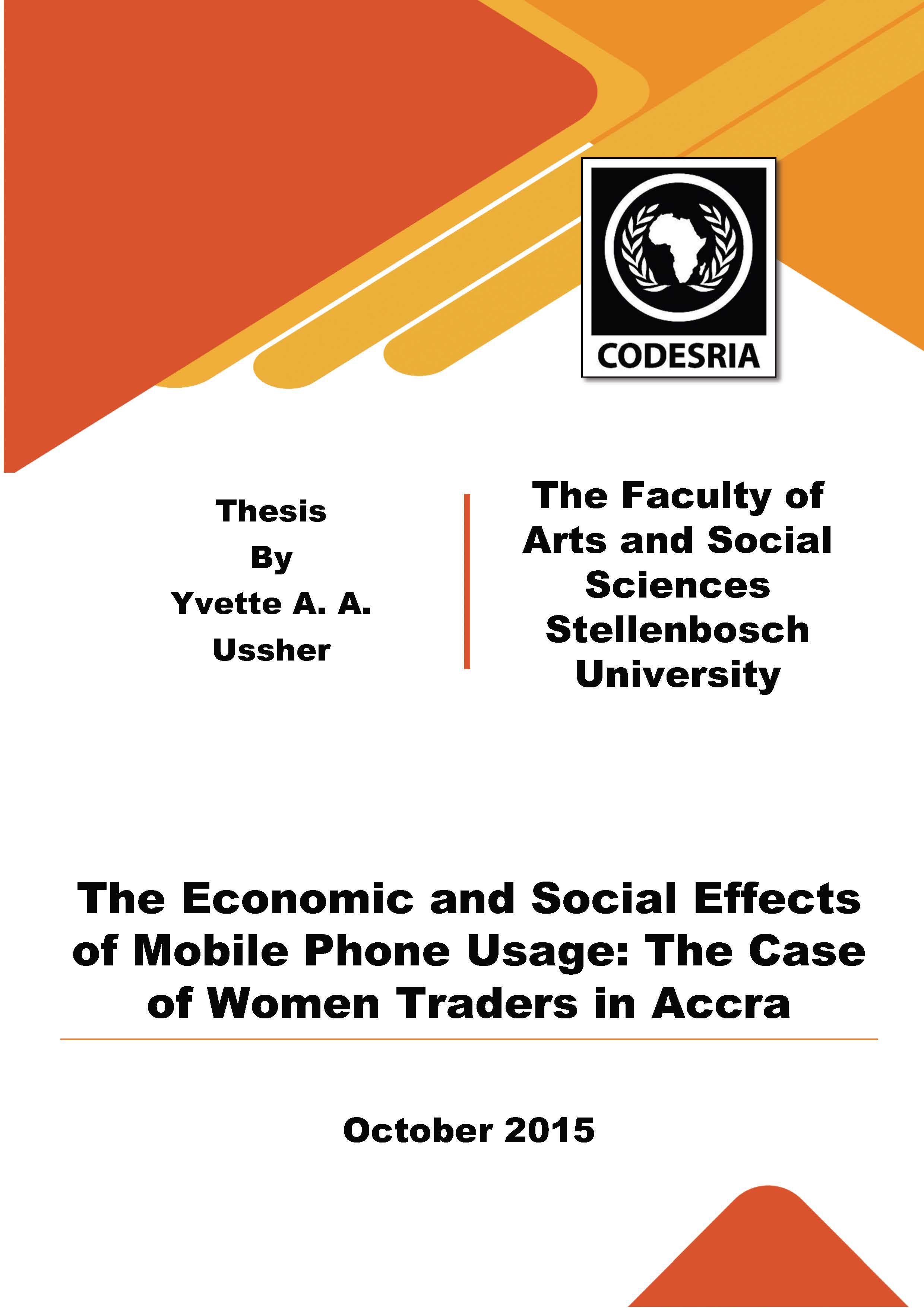The Economic and Social Effects of Mobile Phone Usage: The Case of Women Traders in Accra
Keywords:
Mobile Phone, Women Traders, AccraSynopsis
Research on the impact of mobile phones - and associated information and communication technologies (ICTs) - on micro and small enterprises (MSEs) is on the ascendancy in the contemporary "JCT for Development" (ICT4D) scholarship milieu. There have however been relatively few studies focusing on both access and the quality of mobile phone use in the informal MSE sector. This is particularly conspicuous in the case of Ghana, where there is not much research on the impact of mobile phones on the businesses and lives of informal micro-traders. This thesis explores the manner in which women micro-traders have integrated mobile phones into their businesses and how this has affected their lives. The research takes the form of a multi-sited case study and uses semi-structured interviews and participant observation to explore patterns of mobile phone use among women in four markets in Accra - Makola, Agbogbloshie, Kaneshie and Madina. The study focuses specifically on microtraders working in the wholesale and retail markets for vegetables and textiles. Two broad conclusions follow from this research. Firstly, at the level of individual experiences, the women traders recount how mobile phones have become indispensable to their trading activities. The study finds that mobile phones improved the working routine of the women in
a number of ways: by improving the exchange of market information (via calls and to some extent texting); by enhancing the coordination of micro-trading activities; by strengthening relationships and trust within trading networks; and by helping to reduce transactional and transportation costs. The effects of mobile phones on these women's micro-trading activities have extended positively into their social lives. As profit margins have increased and costs have been reduced, the resulting improvement with respect to incomes has enabled these women to attain an improved 'self-image' and a new level of socio-economic status within the informal economy of Accra. Secondly, notwithstanding the benefits reported by the women micro-traders, the study also suggests wider patterns associated with digital inequality. The women had limited technological knowledge of their mobile phones, and made limited use of more advanced mobile services, such as mobile money transfer and mobile banking. These patterns are explained in terms of inequality with respect to various forms of literacy: basic language literacy; technical literacy; and information literacy. Key dimensions of inequality include age/intergenerational differences and educational differences. While the study explores these patterns of inequality with respect to mobile phone use, it concludes by arguing that the integration of mobile phones into micro-trading has introduced some formality into the domain of informal micro-trading in Accra.
Downloads
References
Abdallah, M. 2007. Accra, Ghana. The Bronx Journal. [online] Available: www.thebronxjournal.com/accra-ghana/ (2014, March 8).
Abraham, R. 2007. "Mobile Phones and Economic Development: Evidence from the Fishing Industry in India." Information Technologies and International Development, 4(1): 5-17.
Accra Metropolitan Assembly (AMA), 2006. Know more about the AMA. Historical background. [ online] Available: http://ama.ghanadistricts.gov .gh/?arrow=atd& =3&sa=2995 (2013, June 8).
Adu-Amankwah, K. 1999. Trade Unions in the Informal Sector. In Trade Unions in the Informal Sector: Finding their bearings. Nine country papers. Labour Education 1999/3. No.116, !LO.
Agar, J. 2004. Constant Touch. A Global History of the Mobile Phone. Allen & Unwin Pty Ltd.
Aker, J. C. 2008. "Does digital divide or provide? The impact of cell phones on grain markets in Niger, "Bread Working Papers, 177.
Aker, J. C. & Mbiti I. M. 2010. "Mobile Phones and Economic Development in Africa". Journal of Economic Perspectives, 24(3): 207-232.
Akerloff, G. A. 1970. "The market for "Lemons": Qualitative Uncertainty and the Market Mechanism". Quarterly Journal of Economics, 84, 488-500.






